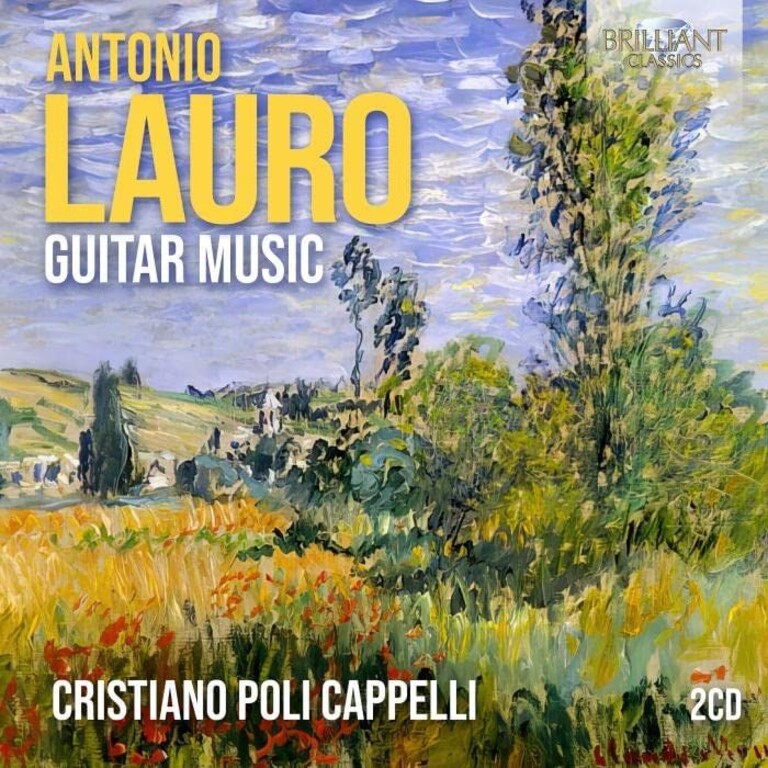Musikk
Ledig
Antonio Lauro: Guitar Music
Beskrivelse
Disk 1 Ana Cristina (Canción De Cuna) Zulay Adiós a Ocumare Papelón Ana Florencia (Canción De Cuna) Tatiana Andreina Natalia Yacambú Angostura (Valse Venezolano) Carora Cueca Chilena I. Fantasia II. Pavana III. Giga El Niño El Marabino El Negrito María Carolina María Luisa Romanza I. Allegro II. Pavana III. Giga Disk 2 El Totumo De Guarenas La Catira I. Registro II. Danza Negra III. Canción IV. Vals Armida Madrugada La Negra Variaciones Sobre Una Canción Infantile Estudio I Estudio II Estudio III Estudio IV Canción Flores De La Montaña La Gatica Crepuscolar Merengue Momoti Nelly Nocturno Oriente Pasaje Aragüeño Pavana Petronila Virgilio Seis Por Derecho. Born in Venezuela to Italian parents, Antonio Lauro (1917–1986) was very young when he began taking music lessons from his father. At the age of 9, Lauro, against his family’s wishes, began lessons in piano and composition at the Academia de Música y Declamación. However, after he encountered the music of Agustín Barrios Mangoré, Lauro gave up his violin and piano studies to dedicate himself completely to the guitar, moved as he was by Mangoré’s music. Lauro went on to become an exceptional guitarist, as well as a composer. Politically engaged, Lauro was a fervent nationalist, and it was his political convictions that drove him to celebrate, and make in-depth studies of, the origins and heritage of Venezuelan music. In 1951, Lauro was imprisoned by General Marcos Pérez Jiménez on account of his democratic convictions; Lauro would later describe his prison experience as a normal part of life for a Venezuelan man of his generation. However, imprisonment did not deter him from organising a series of concerts, as well as continuing to compose wonderful pieces that would later win him the National Music Prize, Venezuela’s highest artistic award. And it was during his time in prison that he wrote two of his most important pieces: the Sonata for guitar and the famous Suite venezolana, followed by his Concerto for guitar and orchestra. His music, and particularly his pieces for guitar, transcended the confines of Venezuela’s musical scene to become a hugely important benchmark for subsequent generations of players worldwide. His compositions for guitar aimed to create a synthesis of Venezuelan popular music with elaborate forms from the European tradition. He took inspiration firstly from popular and folk-inspired pieces such as the Venezuelan waltzes (valses venezolanos) and pieces written in traditional styles; secondly, from demanding works deploying the most sophisticated aspects and features of the Western compositional tradition, such as the Sonata and the Suite venezolana; and thirdly, contrapuntal styles. Lauro is a composer whose greatness is deserving of recognition above and beyond his accomplishments in the reinterpretation of music from the popular and folk traditions, hugely successful though these were. His great achievement as a composer was to absorb and synthesise, in an entirely idiosyncratic and personally creative manner, a range of highly distinct elements and to bring them to life in compositions of real substance. This recording aims to bring together all the different facets of Lauro’s musical personality, while attempting to avoid the cliché of a folk-based, instinctual interpretation, instead approaching his music in a more structured manner. The son of two Italians, a barber and a musician, Antonio Lauro (1917-1986) was born in Ciudad Bolívar, Venezuela. He began at an early age to take music lessons from his father. The family moved to Caracas, a city with many stimuli and full of opportunities and he started taking music lessons, studying piano and composition at the Academy of Music and Declamation. It would be his encounter with the music of Agustín Barrios Mangoré, who was giving a series of concerts in Venezuela at the time, that he decided to abandon the study of the piano and violin to dedicate himself completely to the guitar, becoming an exceptional guitarist and composer. Antonio Lauro was, in 1938, the first Venezuelan to complete formal studies in classical guitar, while at the same time cultivating a career as a popular musician and performing in a trio for voice and guitars with which he toured all of South America. Lauro was politically committed and a fervent nationalist. This inspired him to celebrate and explore his Venezuelan origins and musical heritage: he was particularly attracted to the Venezuelan Waltz form, characterized by its brilliant, rhythmic melodies and frequent use of the hemiola and changes of metre and tempo. In 1951, Lauro was imprisoned, because of his democratic convictions, by General Marcos Pérez Jiménez, this however did not stop his composing activities, it was during his time in prison that he wrote two of his most important works: the Sonata for guitar and the famous Venezuelan Suite, followed by the Concerto for guitar and orchestra. In his compositions for guitar Lauro aimed to unite popular Venezuelan music with complex forms of the European tradition. They are highly attractive, melodious works, full of spirit, charm and brilliant writing for the instrument. Beautifully played by Cristiano Poli Cappelli, one of the leading Italian guitarists. He already recorded several successful albums for Brilliant Classics with music by Gangi, Tansman, Carlevaro and Castelnuovo-Tedesco.
Flere opplysninger
- Medvirkende
- Cappelli, Cristiano Poli (Utøver)
- Lauro, Antonio (Komponist)
- Språk
- Bokmål
- Medium
- lydopptak
Eksemplarer til utlån
| Bibliotek | Avdeling | Plassering | Status |
|---|---|---|---|
| Asker | Musikkavdelingen | klassisk | Ledig |
